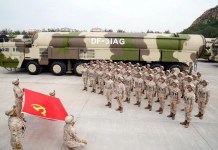Saudi Arabia’s decision to shift a multi-billion-dollar refinery deal from Gwadar to Karachi is seen as a huge setback for the China-Pakistan Economic Corridor (CPEC), a part of Xi Jinping’s ambitious Belt and Road Initiative (BRI).
- WATCH: Russian Su-30 Fighter Forces F-35 Stealth Jets To Retreat In Their ‘First-Ever Encounter’
- Despite World’s Biggest Navy, Why China Will Struggle To Match Indian Submarines In The Indo-Pacific?
The CPEC project was expected to change the economic fortunes of Pakistan. But of late, it has faced many roadblocks in the form of infrastructure, security, and financial troubles.
The much-anticipated Gwadar port in Balochistan, which has seen scanty development in infrastructure over the years, has now lost a lucrative Saudi refinery deal.
Saudi Arabia has announced that it will move its refinery project from the Pakistani port city of Gwadar to Karachi. Nikkei Asia quoted Tabish Gauhar, special assistant to Pakistan’s prime minister on power and petroleum, as stating that the proposed refinery, along with a petrochemical complex is now expected to be set up at Karachi, Pakistan’s financial capital.
The $10 billion Aramco refinery project was a part of the masterplan for the construction of Pakistan’s largest oil city. During his visit to Pakistan in 2019, Saudi Crown Prince Mohammad bin Salman had signed seven investment deals valued at $21 billion.
They included projects ranging from mineral, energy, petrochemical, and agriculture.
A decision was taken to build the mega oil city on 88,000 acres of land in Gwadar, and the $10 billion Aramco oil refinery was expected to be commissioned within five to six years.
The Gwadar Smart Port City Masterplan had estimated Gwadar’s economy to exceed $30 billion by 2050, with an addition of 1.2 million jobs, eventually making it the “Singapore of Pakistan”.
However, the plan to shift the refinery comes as a big blow to the development of Gwadar, which has been reeling under infrastructural and security issues. A Nikkei Asia report quoted a Pakistani official as saying, “Gwadar can only be a feasible location of an oil refinery if a 600-km oil pipeline is built connecting it with Karachi, the center of oil supply in the country”.
The official added that without such a pipeline, “the transport of refined oil from Gwadar (via road in oil tankers ) to consumption centers in the country will be very expensive.”
It seems that Gwadar shares the same fate as that of the larger CPEC project, of which it is a part. Reports suggest that since its inception in 2013, the project has been stalled for various reasons, ranging from infrastructure to security and financial difficulties.
- At €7.8B, Why Indian Rafale Jets Are ‘Double The Cost’ Than Egyptian Rafales?
- Why Did Netizens ‘Mock’ Nigeria For Importing JF-17 Jets From Pakistan?
CPEC: Infra & Security Concerns
It was believed that CPEC will give a much-needed boost to Pakistan’s economy. But recent reports suggest that the project is moving at a snail’s pace and in fact, the major port Gwadar does not have basic necessities like access to water and electricity.
Even after six years, it has not been connected to areas of northern Pakistan with highways and railways, which necessitated the Saudis to relocate their proposed refinery to the economic hub of Pakistan, Karachi.
The relocation further limits the scope of the future development of Gwadar, and according to an Islamabad-based development analyst, “foreign direct investment in Gwadar will be limited and will remain exclusively Chinese”.

Also, work has been halted at Gwadar in the recent past due to recurrent protests against Chinese investment in the region by Baloch nationalists.
The Baloch have been protesting against the increasing Chinese investment in the province, and many attacks have taken place on CPEC facilities, prompting Pakistani officials to heighten the security at Gwadar and other CPEC installations in the province.
“We have raised two division-size security settlements which are dedicated to providing security to CPEC, besides that, we have increased the number of paramilitary troops’ units from one to two in the province to ensure security,” the director-general of the military’s media wing was quoted in a report.
CPEC’s Fate Hangs In Balance?
While the Covid-19 pandemic affected the pace of the work in 2020, foreign debt limits also slowed down the Chinese investment in Pakistan.
According to reports, in 2018, Prime Minister Imran Khan stalled many projects under CPEC on suspicion of corruption by the previous governments.
Two years on, investigations, however, have revealed many of his Cabinet ministers were involved in corruption scandals in the power sector.
According to estimates, one-third of the power companies of the country are partners in Chinese projects under the CPEC.
The investigation report, in fact, stated irregularities, amounting to over $1.8 billion provided in subsidies to independent power producers (IPPs). This list also included the names of PM’s advisors, Razak Dawood and Nadeem Baber.
In April 2021, it was reported that China and Pakistan differed in their opinions regarding the funding of many projects in the CPEC. Hindustan Times quoted a report published in Modern Diplomacy, written by Fabien Baussart, which underlined Chinese apprehension in funding a critical rail project under CPEC.
“While the country has for long portrayed the $6.8 billion Main Line-I project to be the main artery of the Pakistan Railways and tried to convince China for financing the project, the Chinese side has tried to avoid any commitment for funding”, wrote Baussart.
China has shown interest in offering “a mix of commercial and concessional loans to fund the rail project backed by suitable guarantees by Pakistan”. The report further stated that not many Chinese investors have shown interest to set up facilities at the Special Economic Zones, which have been established under CPEC.
READ MORE
- Watch: The Ultimate Dogfight Between US & Russian Fighter Jets Over A ‘Top-Secret’ Air Base In Nevada
- 30 Times Faster Than Speed Of Sound: Is China Really Winning The Hypersonic Race With Its JF-22 Wind Tunnel?




